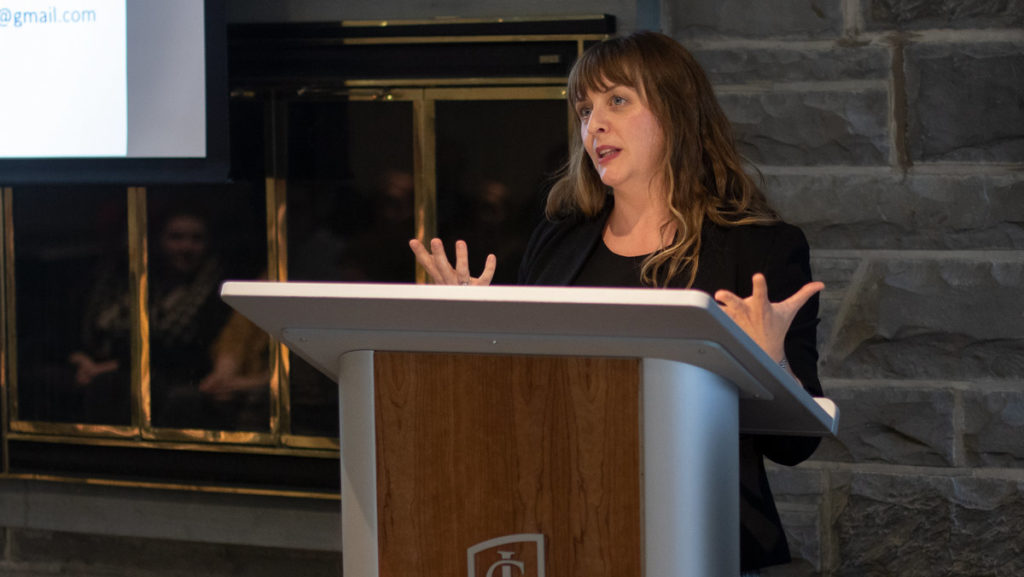A dildo is not the first thing people think of when discussing female empowerment in the 1700s, but for Kathleen Lubey ’97, that is what her research focuses on.
Lubey, associate professor in the Department of English at St. John’s University, spoke in front of approximately 40 students and faculty Oct. 3 in Klingenstein Lounge. She discussed her research on women and their relations to sex toys throughout the 18th century, both in works of 18th-century fiction and nonfiction. Some of these books included “Memoirs of a Woman of Pleasure,” “The True History and Adventures of Catharine Vizzani: A Young Gentlewoman a Native of Rome” and “The Progress of Nature.”
After telling the story about an 18th-century woman named Catharine Vizzani posing as a man, who explored more modern concepts of transgender ideas, Lubey said that sex toys like dildos were used by some women to free themselves from the confines of patriarchal societies.
“As the conclusions of these trans narratives demonstrate, dildos do not promise a utopia of same-sex desire,” Lubey said. “But they mark a separation of penetrative sexuality from the institutions that claimed and operationalized it in the 18th century like prostitution and marriage.”
Lubey said the story of Vizzani shows how women can operate without men, both in sexual acts and wider society.
“So far we’ve looked at female to male trans use of the dildo as a rejection of masculine subjectivity itself, a way of coordinating vaginal penetrative acts that dispense with cis men entirely,” Lubey said. “This kind of sex also unfolds between cis women in pornographic narratives of the 18th century.”
An audience member asked Lubey how the authors of these works being men might have affected the content of the various pieces of literature that were discussed.
Lubey said the authors of many of the works were anonymous, but that did not change the fact that the male-dominated society impacted how these stories were structured by placing greater emphasis on male autonomy than female autonomy.
“A simpler answer to your question is absolutely, heterosexual masculine desire structured the focus of these texts,” Lubey said. “I think even if women did write some of them, they’re still trafficking in that set of conventions.”
Lubey said she cannot help hearing how taboo what she is talking about is.
“The strap-on dildo, in other words, is… sorry I do sometimes hear myself, and I think, ‘What if my mother could hear me?’” Lubey said. “I do have those thoughts. Sorry if I’m being too serious. The strap-on dildo, in other words, facilitates penetrative sex between anatomical women.”
Claire Gleitman, professor in the Department of English, helped to organize the event and said she brought Lubey to campus to inform students on how sex toys were used to erode sexism in the 18th century.
“I thought it would be a great opportunity for our students to see the rich intellectual life that a person can have in the humanities, and an IC graduate at that,” Gleitman said. “More specifically, [Kathleen’s] work on 18th-century pornography calls attention to forms of feminist resistance to the misogyny that was otherwise so pervasive in the 18th century.”
Junior Dean Shinner asked Lubey how she navigates pronoun usage in her work in which someone like Vizzani acted like a man most of their life despite being born a woman.
Lubey said she tried to avoid using certain pronouns during the lecture, but, in her other works, she tries to strike a balance of when to use which pronoun.
“I tried to just say Vizzani or say ‘the’ as a pronoun instead of her or his, so I dodged it a bit in this talk,” Lubey said. “The ethics of it are tricky because on the one hand you don’t want to impose, especially because Vizzani was a historical person. You don’t want to make a decision that modernizes a sexuality that wasn’t available to Vizzani, but, on the other hand, I wouldn’t want to alienate readers today.”
Shinner said it was interesting to hear about the changing power dynamics among men and women when women use dildos.
“I think the implications of what Lubey was talking about, with the dildo as a disassociation of genitalia like a genitalia external from a person who can allow them to access male power that they may not have otherwise, is really fascinating,” Shinner said.








